Container Freight Stations (CFS) are a crucial cog in the supply chain universe — one that plays a key role in the logistics industry by providing a complex and secure operations stage for the handling of containerised cargo. Although these intermediary hubs may simply seem utilitarian at first glance, they’re actually an intricate mix in which the jambalaya of containers, shipments and packages all converge.
Although CFS facilities are playing an increasingly more central role in the larger supply chain world, CFS operations themselves tend to become bogged down by a multitude of inefficiencies relating to manual systems, transport congestion, inadequate customs and compliance data. These issues result in a structure that has become reliant upon a somewhat informal network of paper-based processes and ad hoc databases.
While these inefficiencies are certainly not the only challenges facing CFS suppliers, they are emblematic of some of the most well known obstacles.
The manual processes that have become a staple of CFS organisations are one of the main culprits preventing the smooth and efficient flow of containers in and out of warehouses. These manual processes have adverse impacts throughout the entire CFS organisation, including:
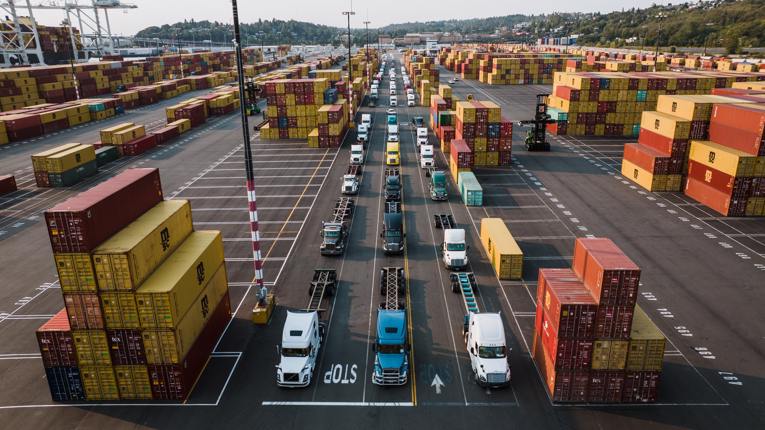
CFS staff are steered towards operating in a more reactive mode, resulting in an oversubscribed workforce, delivery back-logs, customs delays and on-site congestion.
Inefficiencies at a CFS complex can occur for a number of reasons, but a few of the more common issues are:
These inefficiencies are not only extremely costly, but also frustrating to deal with and can lead to a general sense of disarray within the depot.
Overcoming these delays is not the sole determinant in how successful a CFS facility can be, but they are a crucial element.
By digitising the bulk of these operations, CFS managers can ease the pain associated with many common obstacles, alleviating the bottleneck pinch and streamlining the cargo and container handling processes for logistics operators.
As a lower-margin business for logistics service providers, the available technology solutions for CFS have traditionally been under-served by software providers. Typically, CFS operators need to rely on piecing together the portions of larger systems such as a TMS or WMS to access technology to manage their needs.
Below we break down some of the key areas of a Container Freight Station operation and where the gaps within existing systems lie:
|
Key Process in Container Freight Operation |
Transport Management System |
Yard Management System |
Warehouse Management System |
|
Import/Export Management |
✔️: Detailed import/export planning, freight bookings, documentation. |
❌: Lacks the detailed capability to manage import/export operations. |
❌: Mainly focuses on warehouse inventory and lacks the detailed capability to manage import/export operations. |
|
Inventory Management and Inward Goods Reception |
❌: Generally, doesn't offer detailed inventory management on-site. |
✔️: Keeps track of container locations but lacks detailed inventory management. |
✔️: Detailed inventory management with specific location tracking, handles the storage of inward goods. |
|
Container Tracking and Cargo Consolidation |
✔️: Enables tracking of containers during transport, supports cargo consolidation for export. |
✔️: Offers on-site tracking of containers, but lacks detailed cargo consolidation capabilities. |
❌: Lacks the detailed capability to track container movement outside warehouse premises or to consolidate cargo. |
|
Packing, Unpacking, and Sorting of Goods |
❌: Doesn't handle packing, unpacking, or sorting of goods. |
❌: Doesn't handle packing, unpacking, or sorting of goods. |
✔️: Manages packing, unpacking, and sorting of goods for delivery. |
|
Cargo Inspections |
❌: Doesn't typically handle cargo inspections. |
✔️: Supports yard-level inspections but not detailed cargo inspections. |
✔️: Manages detailed inspections of goods within the warehouse. |
|
Documentation Management and Shipping Preparation |
✔️: Manages shipping documentation like Bill of Lading, Freight Bill, etc., and prepares necessary documents for shipping. |
❌: Does not handle shipping documentation or preparation. |
❌: Primarily handles warehouse-related documentation, not freight documentation or shipping preparation. |
|
Customs and Compliance |
✔️: Manages customs documentation, declarations, and ensures compliance with transport regulations. |
❌: Doesn't handle customs or compliance issues. |
❌: Handles compliance within the warehouse but not for transport or customs. |
|
Transportation Coordination |
✔️: Coordinates with multiple transport providers for freight transportation. |
❌: Lacks the ability to coordinate transportation with multiple providers. |
❌: Doesn't handle coordination with transport providers. |
|
Billing and Cost Management |
✔️: Manages transport related costs and billing. |
❌: Doesn't handle billing or cost management. |
✔️: Manages costs related to warehouse operations but doesn't handle transport costs. |
|
Capacity Planning and Optimization |
✔️: Optimizes load planning and freight capacity utilization. |
✔️: Optimizes yard space utilization but doesn't handle transport capacity. |
❌: Focuses on warehouse space utilization, not on transport or yard capacity. |
|
Quality Assurance and Control |
❌: Doesn't typically handle quality assurance for containers or goods. |
❌: Doesn't handle quality assurance for containers or goods. |
✔️: Manages quality assurance and control within the warehouse. |
What this all means is that the functionality is not aligned to current processes and results in workarounds and gaps. Origin’s CFS application is the most comprehensive solution to be specifically developed to address the challenges facing CFS operators. This is a discrete solution that can be used solely for the purposes of the container handling processes endemic to CFS facilities.
Origin is changing the landscape in the CFS technology space, achieving collective progress through individual efficiency.
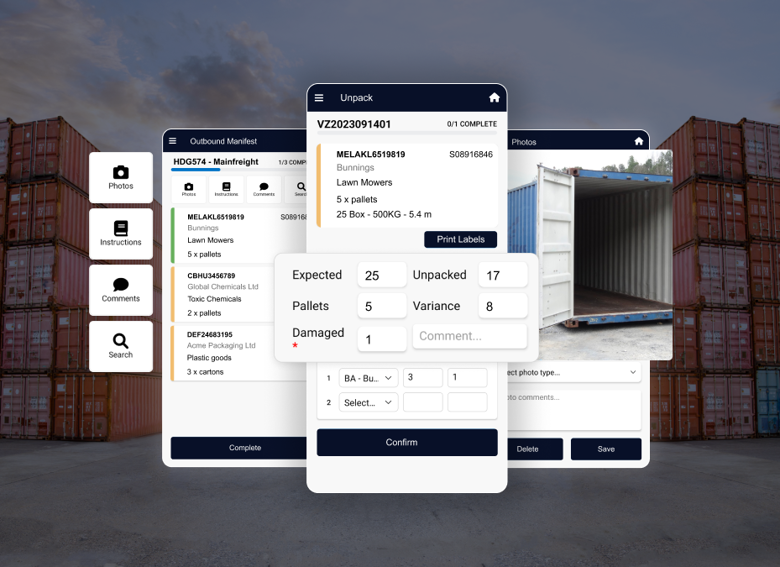
Transport and Logistics providers are searching for a specific type of malleability—the kind that activates a way through the multitude of challenges associated with container freight stations. While these challenges are varied, many of them result in the paper-based processes and suboptimal performance outlined above.
Origin’s CFS solution is helping redefine what is achievable for CFS operators. We have identified the following crucial areas in which the technology has an opportunity to help streamline container handling processes for both domestic and import/export CFS markets.
The CFS sits at the centre of a particularly dense and intertwined portion of the supply chain. Inbound and outbound goods need to be managed in conjunction with container management, customs clearance, consolidation/deconsolidation, tariff calculation, invoicing, biosecurity requirements and more. Integration with this data is the connective tissue that holds a CFS operation together. Providing access to this information provides an elasticity and flexibility that is not currently available.
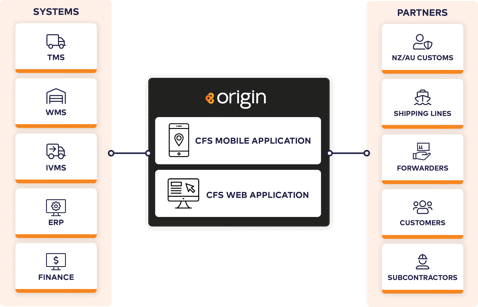
Typically speaking, customs clearance is one of the thornier issues facing CFS facilities. There are a myriad of requirements for getting cargo across international borders (e.g. customs declaration, documentation requirements, biosecurity, tariffs, quarantine holds, inspections, etc.).
Juggling all of these aspects usually involves rigorous, time-consuming scrutiny on the part of CFS staff as they investigate the customs and compliance components of inbound and outbound containers and cargo.
By digitising many of these processes, the Origin solution provides an automated solution in which the majority of these items can be handled in the background, via integration. This results in an emphatic reduction in time spent on the handling of customs and compliance protocols.
Mobility will be one of the key drivers of success for Container Freight Stations moving into the future. As with many other aspects of the supply chain, there are multiple activities simultaneously happening across the entire CFS site. Origin’s ability to manage these tasks with the aid of a mobile device is one of the biggest difference makers for CFS operations moving forward.
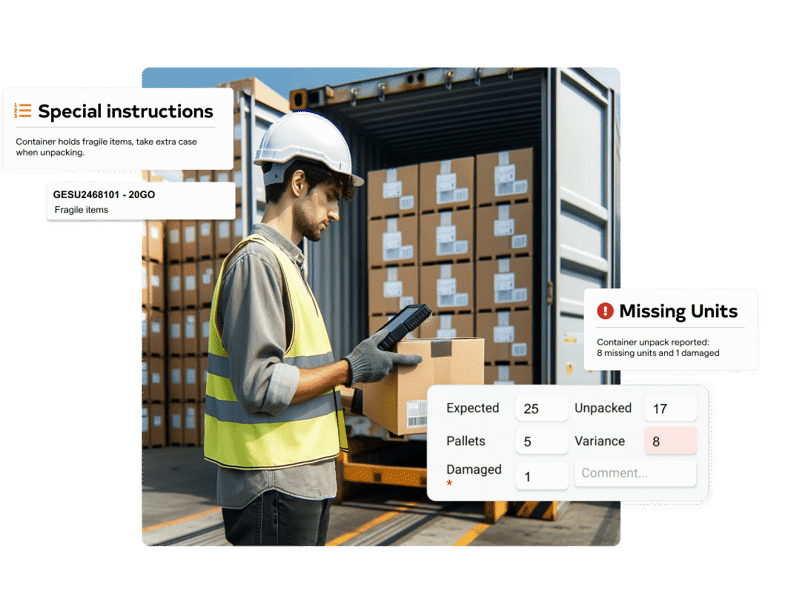
1. Simplification of the import and export process
Origin’s mobile app replaces the stacks of paperwork usually required in the import/export process by giving yard staff the ability to accurately record, photograph and document cargo as it is received and dispatched.
2. Unlocking the congestion dilemma
Complete documentation and identification requirements during the packing/unpacking process, saving time and eliminating the needless paper trail chase.
3. Instant access to job status and cargo data
Origin makes real-time job status and cargo information available via the mobile app, enabling staff to access this information at any time, from any location. Not only does this align internal users, but also provides a pathway to notify external stakeholders with cargo updates.
Simply put: There are a variety of staff with a wide range of roles that make up a smooth running CFS. In order for the operation to function efficiently, these people need the correct tools and processes in place to succeed. In some cases, these tools may be physical tools (automated container terminals, smart containers), but other aspects are better served by a software technology that is able to automate certain processes that are currently manual and labour-intensive.
A working example of CFS Import process boosted by software
Two of the central processes at CFS facilities are the import and export of goods. While both of these processes may happen simultaneously, they involve different activities and staff. In this Import Workflow example, the positive impacts of Origin on the management and alignment of the process is easy to visualise.
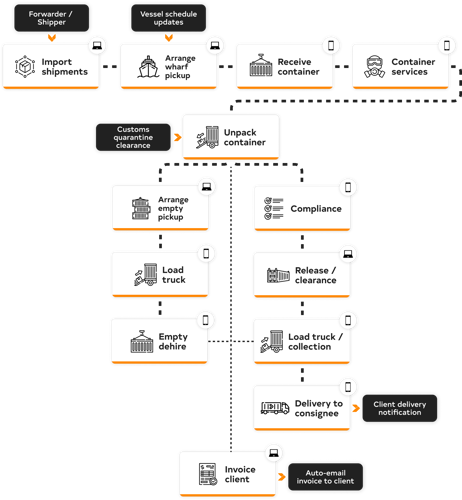
Origin’s CFS solution delivers unparalleled interoperability and flexibility, enabling CFS providers to achieve efficiency gains while implementing robust processes and data transparency.
UX: An intuitive and user-friendly interface, enables users to quickly get in sync with the Origin Order Dashboard, where they can complete the required compliance data and imaging for specific cargo profiles.
Powerful workflow tools: Workflows within the software automatically generate, store and distribute all the necessary documentation. Some examples:
Data transparency: By integrating data from various external sources, Origin provides complete visibility of activities throughout the packing/unpacking lifecycle, an indispensable lever for planning, execution, and reporting on CFS-related jobs and activities. In addition, transparent data promotes a cleaner audit process, greatly reducing organisational risk.
Bidirectionality: Our open architecture has been designed to integrate with the entire set of both internal and external applications. Origin CFS synchronises and manages these relationships centrally, augmenting existing synergies within the full application suite and ensuring a clean partnership in the larger supply chain ecosystem.
Cloud-based optimisation and security: The app is hosted and accessed via a secure cloud-native environment and browser-based platform. Our security framework ensures the correct association of user permissions to update orders, jobs, and events.
Customisation: The technology can be tailored to meet specific operational requirements (e.g. intricate cargo profiles) — eliminating redundancy within operational areas that are not naturally aligned to automation.
Technology solutions are more than just technology. At Origin, our focus is on combining our proven methodologies and implementation experience with a team of experts who have a genuine interest in collaborating with our customers; creating solutions that not only meet the needs of the here and now, but also facilitate the attainment of long-term strategic objectives.
Central to this success is designing technology that enhances efficiency while enabling a transparent view of supply chain processes. Our approach ensures that system users (such as warehouse operators or transport planners) can intuitively adopt the technology without the need for an extended onboarding programme and disruptive change management processes.
We believe that innovation is crucial, and the benefits of this innovation for CFS vary; from delivering on supply chain visibility to streamlining operations by eliminating outdated paper processes.
Our strategy is simple: to catalyse the distinctive qualities of world-class supply chains. We combine our 30 years of expertise with software that's adaptable, facilitating our clients' need to anticipate and respond to evolving customer demands. The team who implement the system are also the ones who support and evolve it, allowing for the system to adapt to changing requirements as we become a valuable supply chain partner.
In other words, we are at our most successful when our customers succeed. This customer-centric approach aligns people, processes and partners to deliver solutions that work in context-specific environments. Origin’s unique methodology and belief in their people helps our customers differentiate themselves from their competition.
© Copyright 2024, Sandfield Associates Limited. All Rights Reserved. Privacy Policy